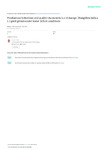Postharvest Behaviour and Quality Characteristics of Mango (Mangifera indica L.) Fruit Grown under Water Deficit Conditions

View/
Date
2009Author
Madigu, N.O.
Mathooko, F. M
Onyango, C. A
Kahangi, E. M.
Owino, W. O
Metadata
Show full item recordAbstract
Preharvest cultural practices affect the postharvest quality and behaviour of
many fruits. In this study we compared the postharvest behaviour and quality of
mango (Mangifera indica L. cv. ‘Tommy Atkins’) fruit from irrigated and nonirrigated trees. The trees were subjected to water stress (non-irrigated) up to 42 days
after bloom (DAB) and control trees were irrigated throughout the year. The fruit
were harvested at 168 DAB (mature stage). Ripening was conducted under ambient
conditions of temperature and relative humidity. Fruit weight decreased with time
and the loss was more pronounced in fruit from non-irrigated trees. Starch content
and total titratable acidity decreased with increase in storage time. Total soluble
solids (TSS) content increased during ripening and fruit from irrigated trees had
higher TSS content. Respiration exhibited a true climacteric curve with ethylene
production being detected at 11 days after fruit harvest. Fruit from irrigated trees
reached climacteric peak almost five days earlier than those from non-irrigated
trees. β-carotene content increased steadily with increase in time, decreasing at 9
days in storage. Although firmness and anthocyanin content decreased with time in
fruit from both treatments, fruit from non-irrigated trees maintained higher values.
Fruit from non-irrigated trees had a longer shelf life than those from irrigated trees
due to a delayed climacteric peak and higher degree of firmness. These results
indicate that irrigation influences fruit firmness, colour development and the
postharvest shelf-life of mango fruit.
